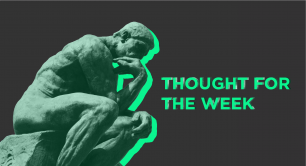Thought for the Week: Notice your survival instincts – and challenge them
Working hard at social change can't be sustained if you don't look out for yourself, too – so, in our new series, we're inviting experts to share guidance, reflections and exercises to help social impact leaders through difficult times. In the final of three posts, Tim Segaller from Rising Minds CIC urges social entrepreneurs to recognise that human instinct can lead us to look inward during times of high pressure. Now, more than ever, we should be forging links with others, helping to grow our collective voice.
So far in this series I’ve looked at how to get more ground beneath your feet during these turbulent times. This is about cultivating resilience, to access the wisest parts of your mind and make good decisions. I then explored the importance of staying true to your deeply-held social purpose, even when it may feel like there are other factors forcing you away.
Both of these processes are essentially ‘inner’ work: enabling you to feel more firmly rooted in your intrinsic resources and in the inspiration of your social vision. From this sure foundation, you’re better placed to turn outwards and engage effectively in the world. And that’s what I’m going to explore here: how you and your business can and must join forces with others in your sector during and beyond this particular crisis.
I want to relate this to the neuroscience principles of my first two pieces. At times of pressure, our prehistorically-evolved response is often to do whatever we need to ensure the survival of ourselves, and those closest to us (our tribe). However, over the millennia humankind has learnt that these automatic reactions don’t always serve us well in the long-term. We have learnt to access wiser parts of our brain that don’t solely operate on narrow or short-term interests. We started co-operating effectively in larger groups.
Our prehistorically-evolved response is often to do whatever we need to ensure the survival of ourselves, and those closest to us
In this context, I encourage you to notice any automatic tendency to consider only your own business, without reference to the wider world and ecosystems you’re in. Perhaps you’re well beyond that – in which case, forgive me if you feel patronised! But to state it really clearly: your business is far more likely to survive if it’s within a whole social enterprise sector that’s thriving.
Fortunately social enterprises seem to be rather good at co-operation. There are many associations and membership organisations that exist to make this happen. Now is a great time to build on this and forge stronger links so that your collective voice can be heard in the marketplace once we’re through this crisis.
And there are likely to be real opportunities on the other side. Many people and institutions are likely to appreciate unexpected positive side-effects of this period of lockdown – living more simply, and an upsurge in altruistic concern for others. Many will want to keep the spirit of this alive – and so will look to socially-responsible organisations for sustainable solutions to our planet’s and economy’s challenges.
Of course, a perennial question that will come into sharper focus once we’re through this crisis is how much the social enterprise sector should be seeking to disrupt conventional economic models, and how much to operate within them. I don’t pretend to have the answer. It’s a highly personal (and political) thing. However, I urge the sector to come together more strongly to have that debate, and to take it confidently into the public arena. I believe the post-Covid world will be more open than ever to listening.
Rising Minds CIC is currently running free weekly webinars on resilience for leaders and teams.
At Pioneers Post we're working hard to provide the most up-to-date news and resources to help social businesses and impact investors share their experiences and get through the Covid-19 crisis. But we need your support to continue. As a social enterprise ourselves, Pioneers Post relies on paid subscriptions and partnerships to sustain our purpose-led journalism – so if you think it's worth having an independent, mission-driven, specialist media platform for the impact movement, please click here to subscribe.



